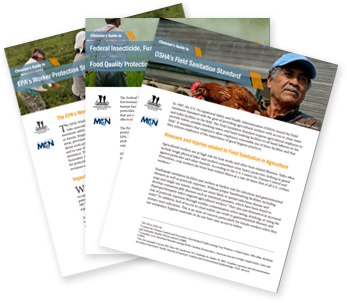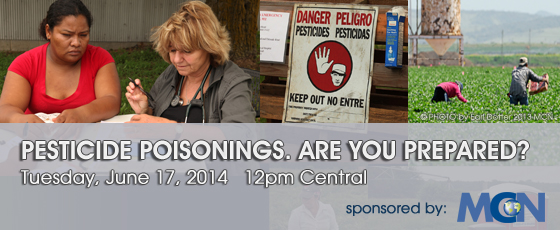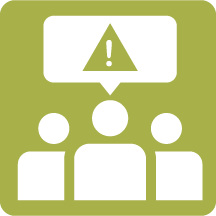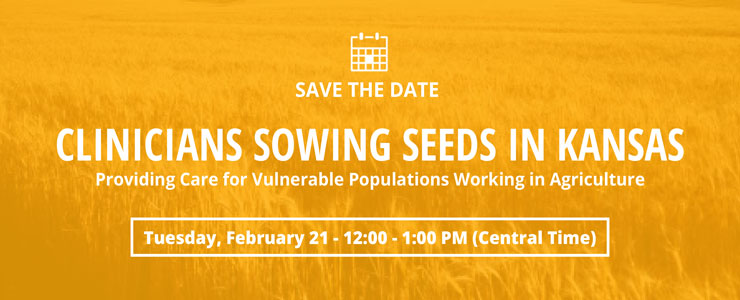Chapter 14: Pesticides Are Poison from the Hesperian.org health guide: A Community Guide to Environmental Health.

FECHA DE GRABACION: 29 de Marzo de 2017, 1 pm ET (zona horaria del Este)
ORADORA: Ileana Ponce-González, MD, MPH, CNC
Crédito de educación continua
Para recibir credito de Trabajador/a de Salud Comunitaria o Educacion de Continua de Enfermera después de ver alguno de estos seminarios usted debe hacer lo siguiente:
- Completar la evaluación participante asociado a cada webinar
- Enviar un correo electrónico con su nombre y apellido indicando que ha completado a contedu@migrantclinician.org
Descripción
En este seminario los participantes serán capaces de identificar las medidas de rendimiento de HRSA relacionadas con la salud bucodental, así como los factores de riesgo para la mala salud bucal. También reflexionaremos sobre el importante papel que desempeñan los promotores de salud en la mejora del acceso a los servicios de salud bucodental.
Objetivos de aprendizaje
- Describa la oferta de servicios orales preventivos y adicionales requeridos en su centro de salud
- Describa las medidas orales de HRSA
- Comprender el papel de los trabajadores comunitarios de salud en la prevención de la enfermedad bucodental
Lectura Adicional
- ADA Store—Brochures for purchase: https://goo.gl/xF1zWU
- ADA Facebook and Twitter ads (free images): https://goo.gl/Q2zsug
- WDS Foundation—Free materials: https://goo.gl/FYxdri
- ADA Practice Guidelines (2016): https://goo.gl/pzyfOd
- Medicaid/CHIP Dental Sealant Measure in the Child Core Set: https://goo.gl/n66YAD
- Texas Health and Human Service: https://goo.gl/H6fAKL
Este proyecto cuenta con el apoyo de la Administración de Recursos y Servicios de Salud (HRSA) del Departamento de Salud y Servicios Humanos de los Estados Unidos bajo el acuerdo de cooperación número U30CS09742, Asistencia Técnica a Centros de Salud Comunitarios y Migrantes y Personas sin Hogar por $ 1,094,709.00 con 0% del total Proyecto NCA financiado con fuentes no federales. Esta información o contenido y las conclusiones son las del autor y no deben ser interpretadas como la posición o política oficial de, ni cualquier endosos deben ser inferidos por HRSA, HHS o el Gobierno de los Estados Unidos.
DATE: February 21, 2017
SPEAKERS: Ed Zuroweste, MD
Continuing Education Credit
To receive CME* or CNE credit after viewing this webinar, you must:
- Complete the Participant Evaluation associated with this webinar
- Send an email with your first and last name stating which webinar you completed to contedu@migrantclinician.org
Description
Agriculture is also one of the most dangerous industries in the United States. For vulnerable populations working in agriculture, their lack of training, poor safety precautions, regulatory exclusions, lack of health insurance, language barriers, piece-rate pay, immigration status, and geographical and cultural isolation can put these workers at increased risk for occupationally related injuries and illnesses and chronic sequelae. Exposure to pesticides and other contaminants is a particular concern to agricultural workers and their families. This continuing education training will discuss health risks facing immigrant and migrant agricultural workers and their families as a result of their working conditions and environment, with a particular focus on Kansas. It will also highlight best practices and resources for the incorporation of environmental and occupational health in the practice setting, showcasing successful initiatives in primary care settings. Participants will explore the importance of and become familiar with the methods to integrate environmental and occupational health into the practice setting from the clinical perspective as well as consider these issues within the framework of social determinants of health.
Resources
- MCN's Environmental and Occupational Health Program (Migrant Health Center Partnership Description)
- MCN's EOH Screening Tool
- Farmworker Clinicians Manual
- Pesticide Reporting and Workers’ Compensation in Agriculture - Interactive Map
- EPA Recognition and Management of Pesticide Poisonings
- MCN & Farmworker Justice Clinician Guides for Farmworker Health and Safety Regulations
- Patient Education Materials
- Immigrant Dairy Worker Health and Safety
- iCuídate!, a comic book aimed at preventing musculoskeletal injuries among farmworkers
- Pesticide Comic Books
This material was produced, in part, under Assistance Agreement No. X883487601 awarded by the U.S. Environmental Protection Agency. It has not been formally reviewed by EPA. EPA does not endorse any products or commercial services mentioned in this product.
A flier created by the CDC's National Diabetes Education Program as a guide for patients in the management of medicines to treat diabetes. Available in English.
- Diabetes and You - All Medicines Matter.pdf (442.21 KB)
Substance Use Warmline
Peer-to-Peer Consultation and Decision Support
10 am – 6 pm EST Monday - Friday
855-300-3595
Free and confidential consultation for clinicians from the Clinician Consultation Center at San Francisco General Hospital focusing on substance use in primary care
Objectives of the Substance Use Warmline:
- Support primary care providers in managing complex patients with addiction, chronic pain, and behavioral health issues
- Improve the safety of medication regimens to decrease the risk of overdose
- Enhance the treatment, care and support for people living with or at risk for HIV
- Discuss useful strategies for clinicians in managing their patients living with substance use, addiction and chronic pain.
Consultation topics include:
- Assessment and treatment of opioid, alcohol, and other substance use disorders
- Approaches to suspected misuse, abuse, or diversion of prescribed opioids
- Methods to simplify opioid-based pain regimens to reduce risk of misuse and toxicity
- Urine toxicology testing- when to use it and what it means
- Use of buprenorphine and the role of methadone maintenance
- Withdrawal management for opioids, alcohol, and other CNS depressants
- Harm reduction strategies and overdose prevention
- Managing substance use in special populations (pregnancy, HIV, hepatitis)
- Productive ways of discussing (known or suspected) addiction with patients.
The CCC’s multi-disciplinary team of expert physicians, clinical pharmacists and nurses provides consultation to help clinicians manage complex patient needs, medication safety, and a rapidly evolving regulatory environment.
Learn more at http://nccc.ucsf.edu/clinician-consultation/substance-use-management
- CCC Substance Use Warmline Flier EST 7.25.16.pdf (112.12 KB)
This 90-minute webinar was created for physicians, nurses, and other health professionals who treat and case manage patients with active TB. The webinar introduced the 2016 Official American Thoracic Society/Centers for Disease Control and Prevention/Infectious Diseases Society of America Clinical Practice Guidelines: Treatment of Drug-Susceptible Tuberculosis. This training highlighted the guidelines development process, the key changes in recommendations, and discussed the evidence supporting the changes. The webinar was originally presented on November 4, 2016. This training was jointly sponsored by all 5 RTMCCs.

DATE RECORDED: August 17, 2016 at 1 pm ET
PRESENTED BY: Amy Liebman, MPA, MA and Wilson Augustave, member of MCN’s Board of Directors and Senior HIV Case Manager at Finger Lakes Community Health
This material will be produced under grant number SH-27640-15-60-F-48-SH5 from the Occupational Safety and Health Administration, U.S. Department of Labor. It will not necessarily reflect the views or policies of the U.S. Department of Labor, nor does mention of trade names, commercial products, or organizations imply endorsement by the U.S. Government.
- http://migrantclinician.adobeconnect.com/p50hmpih2ti/?OWASP_CSRFTOKEN=3e2b187aeeb1282a41d5df37d8a98c307a7e00006662aca9d5f21dc12aa036c4
- http://www.migrantclinician.org/
- http://workerscomphub.org/
- http://workerscomphub.org/navigating-system
- https://www.osha.gov/workers/index.html
- http://www.coshnetwork.org/know-your-rights
- http://hesperian.org/books-and-resources/

MCN and Farmworker Justice offer these guides to assist clinicians in understanding farmworker health and safety regulations. OSHA’s Field Sanitation Standard; EPA's Federal Insecticide, Fungicide, and Rodenticide Act (FIFRA); EPA's Food Quality Protection Act (FQPA); EPA’s Worker Protection Standard (WPS).
- OSHA's Field Sanitation Standard Clinician's Guide.pdf (747.53 KB)
- FIFRA FQPA Clinician Guide.pdf (287.9 KB)
- WPS Clinician's Guide.pdf (843.35 KB)
Este diccionario ilustrado bilingüe de MCN, "Seguridad en Palabras/ Safety in Words", muestra los peligros que hay en el lugar de trabajo y las mejores prácticas para la salud y la seguridad en la agricultura. Desarrollado con el apoyo del Programa de Subvenciones Susan Harwood de OSHA, este recurso refuerza el vocabulario en inglés de los trabajadores que hablan español lo que ayudará a prevenir lesiones en la agricultura.
DATE RECORDED: Wednesday, June 17, 2014
PRESENTED BY: Matthew Keifer, MD, MPH, Dean Emanuel Endowed Chair/Director National Farm Medicine Center
 |
|
 MCN’s Environmental and Occupational Health Programs
MCN’s Environmental and Occupational Health Programs
Learn more about MCN’s training and technical assistance programs to help clinicians and health centers improve the recognition and management of pesticide exposures and other environmental/occupational health conditions.
Mistakes can be dangerous. Accurate identification of pesticides responsible for a patient's illness is important to avoid iatrogenic errors with respect to acute treatment. Join us for an important webinar that will focus on key decision points in the diagnosis of pesticide exposures and emphasize the usefulness of the newly revised resource for clinicians - The Recognition and Management of Pesticide Poisonings, 6th ed. Through interactive case studies, this webinar will illustrate effective recognition and treatment of patients over exposed to pesticides.
The webinar, sponsored by Migrant Clinicians Network, the National Farm Medicine Center and AgriSafe Network features Dr. Keifer, a board certified occupational medicine specialist and internationally renowned researcher regarding pesticides and agricultural health and safety. For over 30 years, Dr. Keifer has focused his clinical practice and research largely on farmworkers.
SPONSORED BY: AgriSafe Network, Migrant Clinicians Network, and the National Farm Medicine Center
OBJECTIVES: Participants will be able to:
- Better recognize the signs and symptoms of pesticide overexposure
- Identify key decision points in diagnosing pesticide exposures
- Demonstrate an understanding of how to use The Recognition and Management of Pesticide Poisonings, 6th ed. in a clinical setting
We encourage all participants to order The Recognition and Management of Pesticide Poisonings, 6th ed. prior to attending this webinar. Order here. PDF versions are also available at http://www2.epa.gov/pesticide-worker-safety/recognition-and-management-pesticide-poisonings
If you have experienced any trouble ordering your copy please contact: kbrennan@migrantclinician.org
CLINICAL TOOLS & RESOURCES |
|
PATIENT EDUCATION MATERIALS |
|
ARCHIVED WEBINARS & TRAINING RESOURCES |
|
LOCAL PESTICIDE RESOURCES |
|
The following will provide information regarding the pesticides used in your areas:
|
- http://migrantclinician.adobeconnect.com/p77irjl7cvq/
- http://www.marshfieldclinic.org/nfmc/
- http://www.agrisafe.org/
- http://1.usa.gov/1aF9rHY
- http://www2.epa.gov/pesticide-worker-safety/recognition-and-management-pesticide-poisonings
- http://1.usa.gov/1fFUSZm
- http://bit.ly/1imO43V
- http://npic.orst.edu/
- http://www.aapcc.org/
- http://extoxnet.orst.edu/
- http://www.pesticidemededucation.com/
- http://www.extension.umn.edu/agriculture/pesticide-safety/program-team/
- http://www3.extension.umn.edu/county
- http://web.extension.illinois.edu/psep/about/psepteam.cfm
- http://web.extension.illinois.edu/state/findoffice.cfm
Este libro cómic bilingüe a todo color trata la indemnización laboral por accidente, los derechos y responsabilidades de los trabajadores inmigrantes que trabajan en granjas lecheras. Cuenta la historia de un trabajador mexicano de una granja lechera que se lesiona en el trabajo y los pasos que él y su empleador dan para asegurarse de que reciba sus beneficios y la granja mejore su seguridad. Incluye historias aplicables en todo Estados Unidos y otras específicas de cada estado.
- DairyWrkrRightsWrkComp_ENG2016_web.pdf (7.78 MB)
- DairyWrkrRightsWrkComp_ESP2016_web.pdf (7.92 MB)
- COMIC - Safety and Health on the Farm - New Mexico - English.pdf (3.4 MB)
- COMIC - Safety and Health on the Farm - New Mexico - Spanish.pdf (3.41 MB)
- COMIC - Safety and Health on the Farm - New York - English.pdf (3.45 MB)
- COMIC - Safety and Health on the Farm - New York - Spanish.pdf (3.46 MB)
- COMIC - Safety and Health on the Farm -Minnesota -English.pdf (7.78 MB)
- COMIC - Safety and Health on the Farm - Minnesota - Spanish_0.pdf (7.91 MB)
This website and training material were developed to give communities and promotores ways to help farm workers learn how to protect themselves from pesticide exposure.
The project and all materials on the website were developed by the California Poison Control System in collaboration with the the Western Center for Agricultural Health and Safety at the University of California, Davis and the California Department of Pesticide Regulation.

- DPR_Facilitator_Manual_EN.pdf (4.77 MB)
- DPR_Participant_Manual_EN.pdf (4.91 MB)
Señales y síntomas de envenenamiento por pesticidas
Developed by the California Poison Control System in collaboration with the Western Center for Agricultural Health and Safety at the University of California, Davis and the California Department of Pesticide Regulation
Haz-Map® is an occupational health database designed for health and safety professionals and for consumers seeking information about the adverse effects of workplace exposures to chemical and biological agents. The main links in Haz-Map are between chemicals and occupational diseases. These links have been established using current scientific evidence.
Three printable brochures on Asthma, Lead and Pesticides produced by Farmworker Justice.
- SpanishBrochures.pdf (4.88 MB)
- EnglishBrochures.pdf (4.88 MB)
MCN's Pesticide Clinical Guidelines and Pesticide Exposure Assessment Form assist in the recognition and management of acute pesticide exposures in primary care settings.
The pesticide guidelines were adapted from guidelines developed by Dr. Dennis H. Penzell, a former medical director of a Community and Migrant Health Center with experience in large-scale pesticide exposure incidents.
The Acute Pesticide Exposure Form was adapted from the data collection on an acute pesticide exposed patient tool developed by Matthew C. Keifer, MD, MPH, Director of the National Farm Medicine Center, appearing in the EPA's Recognition and Management of Pesticide Exposures, 6th Edition, EPA 2013.
These resources were developed with guidance from MCN's Environmental and Occupational Health Advisory Committee - a panel of healthcare professionals and researchers with expertise in pesticides and migrant health.
- PesticideClinicalGuidelines_2014Nov.pdf (395.73 KB)
- 2022-Pesticide-Exp-Assessment_ENG.pdf (316.56 KB)
- 2016-08-16 - Acute Pesticide Exposures Clinical Guidelines (Spanish).pdf (203.88 KB)
- 2022_Pesticide-Exp-Assessment_SPA.pdf (626.33 KB)
The importance of clinical diagnostic tools and biomonitoring of exposures to pesticides as well the role of clinicians in pesticide reporting and the challenges clinicians face in accurately diagnosing patients exposed to pesticides are described in a presentation by Matthew Keifer, MD, MPH and Amy K. Liebman, MPA. Click on the link for an APHA policy resolution underscoring the need for clinical diagnostic tools and biomomitoring of exposures to pesticides. This policy supports the information outlined by in the presentation.
This resource helps you address stigmatization by providing best practices for inhibiting and the actions to take when you encounter stigmatization when new infectious diseases and illness emerge.
Early in an outbreak, such as the 2009 H1N1 outbreak, groups of people, places, and animals can be singled out and will be at risk of being stigmatized by association with the threat this virus poses. Groups are stigmatized by an infectious disease when the risk of infection to others is not present or remote but the association of the risk is magnified by others for that population group, or place or animal.
- CERC Stigmatization fact sheet.doc (89.5 KB)
Outlines the knowledge and skills that health professionals need to have about pesticides. This document is part of a national initiative aimed at ensuring that pesticides issues become integral elements of education and practice of primary care providers. English and Spanish
- NEETFPesticidePracticeGuidelines.pdf (2.04 MB)
- NEETFHabilidadesParaLaPracticaPesticidas.pdf (668.29 KB)
American Association of Poison Control Centers Offers a listing of regional Poison Control Centers. Poison Control Centers provide information regarding possible or actual environmental or occupational exposures and recommended treatments. The website offers education for children and adults.

Este libro cómico sobre pesticidas está dirigido a los trabajadores comunitarios y a las familias de trabajadores agrícolas migrantes y temporales. Tiene por objeto educar a los padres sobre los riesgos de exposición a pesticidas que tienen sus hijos y cómo reducir estos riesgos de exposición. La última edición sólo está disponible en español, aunque estamos trabajando para publicar una versión actualizada en inglés.
Actualmente se encuentra agotado el formato impreso de este libro cómico. Estamos buscando fondos adicionales para imprimirlo. Mientras tanto, usted puede descargar una copia electrónica libremente.
- AUNQUE-CERCA-SANO-2020_PRINT.pdf (21.69 MB)
- PesticidesNearbyButHealthyENG_2007_0.pdf (1.33 MB)
A Spanish language trifold with pesticide safety information.
- TrCaptico_pesticidas.pdf (7.28 MB)
A Spanish language comic books that explains the dangers of pesticides and offers practical, less toxic approaches to pest control. Produced by the Center for Environmental Resource Management at UTEP.
El manual es una guía que pueden usar los trabajadores comunitarios, educadores y promotores de salud durante sus actividades educativas en la comunidad. Ofrece información sobre los riesgos de la exposición a los contaminantes ambientales y plaguicidas y las formas de reducir esos riesgos. También incluye información y consejos útiles para trabajar en la comunidad.
En cuanto al libro cómico, los trabajadores comunitarios, educadores y promotores de salud pueden usarlo como una herramienta educativa para informar a su comunidad sobre los riesgos de los contaminantes ambientales y los plaguicidas.
- pocovenenocomicless20.pdf (16.8 MB)
- Poco Veneno No Mata 2nd Edition - June2019.pdf (5.27 MB)
- A LITTLE POISON WILL IT KILL YOU_June-2019.pdf (5.14 MB)
Pesticide and Pregnancy Handout, English and Spanish, from the Wake Forest University School of Medicine.
- PesticideandPregnancyHandoutEnglish.pdf (3.45 MB)
- PesticideandPregnancyHandoutSpanish.pdf (3.79 MB)
